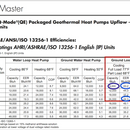Modeling of HERS Score parameters
Why are HERS score parameters for GSHPs modeled with the “equipment performance data from the nameplate” while ERVs are modeled “according to how it’s designed to operate”. The quotes are taken from a HERS trainer.
I designed my newly constructed home to be as energy efficient as reasonable. I hoped to get to a HERS score of 30 or lower. Though my HERS score has not yet been computed, I have been advised by the HERS rater that because of my choice of equipment the HERS score may not be as low as it might have been, had I used a less efficient Ground Source Heat Pump.
In the pre-construction phase I carefully designed the house to have loads that fit my GSHPs most efficient operating speed and chose the GSHP to operate most efficiently at the designed loads.
If my understanding is correct:
The modeling of the HERS score for my ClimateMaster Trilogy 45 Q-mode 0930 is based on its capability at it’s maximum speed which would be an EER of 24.3 (see attachment). Whereas, at the designed Maximum Cooling Load of 9,563Btu/hr, at design temp, the unit will operate at an EER of 43.2 (on exceedingly hot days the load should remain below 12,000Btu/hr at which time the EER would be even better at 44.3). As the load increases above 12,000 Btu’s the EER drops off until at it’s maximum capacity of 24,000Btu/hr it has an EER of 24.3. So it appears that when modeling the “0930”, the efficiency of the unit operating at it’s maximum capacity, an EER of 24.3 is what is used (despite the fact that the unit will Never see this condition) instead of the efficiencies at which the unit actually operates. One would wish that the modeling would consider the speed and hence the EER at which it actually operates and assign a HERS score on that basis.
My ERV is modeled differently. The ERV is modeled “according to how it’s designed to operate”. Well, that makes sense to me. It operates at 62.5 Cfm so it’s modeled for operating efficiently at low speeds instead of it’s less efficient operation at it’s 218 Cfm maximum capability.
I actually change the speed of the ERV frequently for showers, cooking and the like when it operates at a lower efficiency, but HERS doesn’t penalize me for that. However, the speed of the GSHP is carefully set not to change so that it remains at it’s most efficient speeds, but HERS fails to reward me for that and penalizes me by considering only an efficiency for a speed at which it will never operate.
Is my understanding correct ?
Why are these two pieces of equipment treated differently ?
Is there a recourse, or an appeals process that I can pursue to improve my HERS Score ?
I’m really more interested in this for my builder, a great guy and a great builder who consistently builds homes with HERS scores in the low 30s. This same issue arose in his last couple homes using this same GSHP with an EER of 45, which has resulted in slightly higher HERS scores than when he used an older two speed GSHP). The HERS rater advises that this is the cause. He is competitive with his prior work, and we had hoped to break into the twenties with this house.
(We did manage a blower door test of 123 Cfm with a resultant 0.25ACH50, somewhat above my goal of 0.1ACH50 but good nevertheless).
GBA Detail Library
A collection of one thousand construction details organized by climate and house part










Replies
Ted,
The short answer is, "I don't know." I hope that a knowledgeable GBA reader -- someone who has waded deeply into the weeds of HERS calculations -- can respond with a helpful explanation.
In case there is a useful gem somewhere in the article, you may want to read "How Is a Home’s HERS Index Calculated?"
Are the risk of stating the obvious, here are some relevant facts:
1. The HERS Index is a flawed rating system.
2. Assuming you have no plans to alter any of the equipment in this homes, the HERS Index is irrelevant. Appealing the calculation in hopes of lowering your HERS Index, won't change the amount of energy that your home uses.